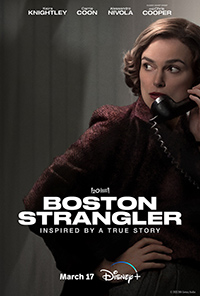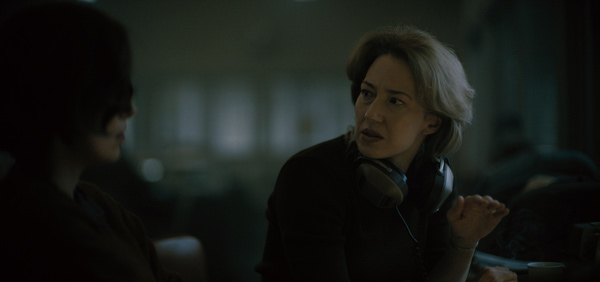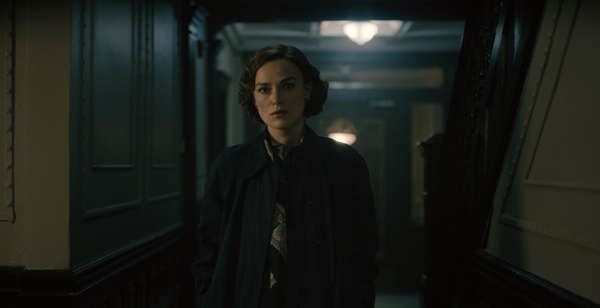Thank You for Choking: Ruskin Explores the Sordid Politics Behind Infamous Serial Killing Case
 The tribulations of femininity in the fourth estate anchors Boston Strangler, an investigative procedural from director Matt Ruskin which explores the peripheral but important personalities who helped shape our cultural commentary on one of America’s most infamous serial killers. The only trouble is, there remains so much speculation about those responsible for the brutal murders of thirteen Bostonian women, Ruskin’s film can’t quite strike a pose in equanimity, leaving his audience wanting more. However, this is hardly a terrible problem for a film to have, especially one which flies through its nearly two-hour running time on the compelling shoulders of Keira Knightley and Carrie Coon. But the material deserves a more comprehensive treatment, either as a well-researched documentary or an immersive miniseries with enough magnitude to explore all the intersecting angles, which leads Ruskin’s film to feel unsatisfying for those expecting either a thriller, a character study, or an expose on misogyny tinted corruption.
The tribulations of femininity in the fourth estate anchors Boston Strangler, an investigative procedural from director Matt Ruskin which explores the peripheral but important personalities who helped shape our cultural commentary on one of America’s most infamous serial killers. The only trouble is, there remains so much speculation about those responsible for the brutal murders of thirteen Bostonian women, Ruskin’s film can’t quite strike a pose in equanimity, leaving his audience wanting more. However, this is hardly a terrible problem for a film to have, especially one which flies through its nearly two-hour running time on the compelling shoulders of Keira Knightley and Carrie Coon. But the material deserves a more comprehensive treatment, either as a well-researched documentary or an immersive miniseries with enough magnitude to explore all the intersecting angles, which leads Ruskin’s film to feel unsatisfying for those expecting either a thriller, a character study, or an expose on misogyny tinted corruption.
After a third woman is found strangled in Boston, 1962, Loretta McLaughlin (Knightley), a reporter for the city’s Record American, suggests the murders are connected. Her gruff editor, Jack Maclaine (Chris Cooper), isn’t so sure, but allows her to pursue the lead off the clock. Tired of puff pieces, McLaughlin’s tenacity leads to a breakthrough in the case when she confirms a macabre connection between the three dead women, all found with nylon stockings around their throats. While the police chief and the DA rail against McLaughlin’s suggestions, more murders inspire Maclaine to officially assign McLaughlin to cover the case, paired with a more reasoned journalist, Jean Cole (Coon), their pictures used on their columns as a stunt campaign. As the two women battle the virulent sexism amongst their peers and the police, ten more murders occur, eventually leading McLaughlin, and her secret police cohort, Det. Conley (Alessandro Nivola) to suspect Albert DeSalvo (David Dastmalchian). But despite DeSalvo’s confession, there’s no real evidence to tie him to the 13 murders he’s admitted to, while similar murders also occurred in New York and Michigan. As McLaughlin struggles for her ideas on multiple killers to be heard, her theories fall on deaf ears.

Knightley is clearly the grimly determined selling point, and Boston Strangler tends to crackle whenever she’s on screen with Carrie Coon, who together share an amiable mix of camaraderie and tough love which excels in all the ways something like the overly earnest She Said (2022) could not. Granted, the stakes seem higher for these two women journalists in mid-1960s Boston, their careers and potentially their lives hanging in the balance for even daring to step into male dominated professional spheres. Knightley also shares a likable chemistry with Alessandro Nivola’s foxy, flirtatious detective, despite the familiarity of their scenario. But like many tangents in Ruskin’s script, theirs is a relationship suffering from cut corners and familiar tropes. Loretta’s relationship with James (Morgan Spector, of Nanny, playing yet another husband cuckolded by his wife’s professional pursuits) is rudimentary cliche from the doomed marriage handbook, while Chris Cooper is a bit wasted as her begrudging editor.

As the film segues from women-in-the-workplace time capsule to the meatier bits of conspiracy theories which blossomed from Boston PD’s bungled investigation and hackneyed confession from DeSalvo (with David Dastmalchian given little room to create any real menace), McLaughlin (and especially Jean Cole) seem to evaporate.
Considering all the unanswered questions, and the likelihood of DeSalvo not being the actual murderer to all those he confessed to (DNA evidence would later connect him definitively to one of the murders), this version of Boston Strangler should feel more like David Fincher’s shadowy Zodiac (2007). In retrospect, it will stand as an interesting companion piece to Richard Fleischer’s sordid 1968 version, The Boston Strangler (starring Tony Curtis and Henry Fonda as culprit and cop, respectively), but ultimately feels more obtuse than the rather thorny and grisly events it’s resurrecting.
★★½/☆☆☆☆☆


